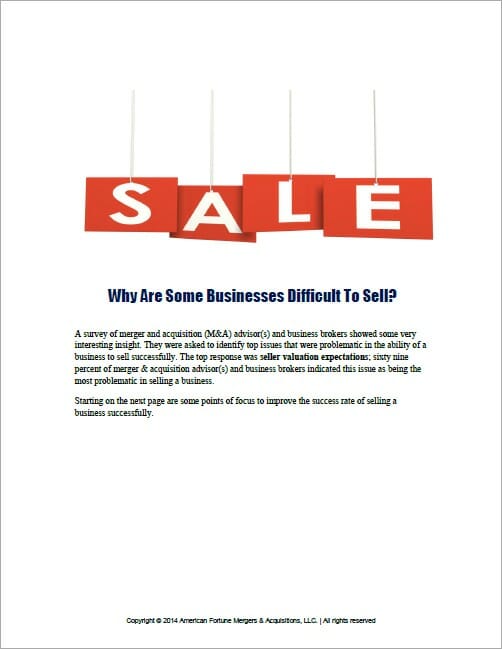How Much is My Business Worth?
 Determining the value of a business isn’t a straightforward formula. In fact, business valuation experts or business brokers might use several methods for valuation and then take the average to set the final value. Other professionals might develop an appraisal based on a single approach. The result is that many business owners can’t easily determine the worth of their company and get the run around from many professionals that want them to pay for expensive services without any explanation.
Determining the value of a business isn’t a straightforward formula. In fact, business valuation experts or business brokers might use several methods for valuation and then take the average to set the final value. Other professionals might develop an appraisal based on a single approach. The result is that many business owners can’t easily determine the worth of their company and get the run around from many professionals that want them to pay for expensive services without any explanation.
We’re here to explain the most important factors that impact a business’s value and why it’s so difficult to use one formula to determine a set figure.
Vital Elements to Determining Your Business’ Worth
The businesses’ worth is not just its assets less its liabilities. Both assets and liabilities play a role, and assets are the starting point for calculating a full business valuation.
Professionals look for three key elements to consider something an “asset.” The assets can be physical or intangible, but they must have economic value, serve as a resource for future revenue, and represent ownership.
Physical Assets
If you’re just starting to ask, “How much is my business worth?” then you want to dedicate some time to review your physical assets first. These are tangible assets. Some are fixed, and others are “current” or easily convertible to cash. The thing they share is that it’s fairly straightforward when assessing value because they can directly sell these items or evaluate their worth while considering usage and depreciation.
Physical assets include:
● Property – Land and building
● Equipment
● Machinery
● Inventory
● Marketable securities
● Furniture
● Cash on hand
Even office supplies count as physical assets. You may be able to set a clear dollar amount for every asset in this category without much debate. A real estate appraisal is separate from the valuation of the business. However, you’ll need to work closely with a skilled broker to assign clear values to your equipment, furniture, and all other physical assets.
Intangible Assets
You don’t have to see it to believe it, or for that matter, profit from it. Intangible assets don’t exist physically. But these assets do have economic value and provide resources for the company to generate future revenue.
Intangible assets include:
● Patents – these do appear on a balance sheet, but those documents don’t accurately show how a patent can support future earnings.
● Copyrights – intellectual property is one of the most critical forms of property, and it ensures that your company and its products remain unique.
● Trademarks – as part of branding, trademarks do contribute to future economic value. Valuing trademarks assumes that they are tied to goodwill and brand recognition.
● Brand recognition – a key component of marketing and marketability, branding is more than a buzzword. How well do people know you, and what do they think of you? This plays a major role in calculating goodwill.
● Operational processes and procedures – how you run your company is unique, and that can make it extremely efficient and productive or a mess. When conducting a valuation, an expert will always look at your documented processes and procedures.
● Vendor and client contracts – Are these contracts transferable? Do they provide clear instruction on transactions, orders, and expectations?
● Licenses and permits – You probably went through quite a bit of trouble to obtain all the licenses and permits necessary to run your business. Businesses derive value from licenses and permits because they could not operate or earn revenue without them.
● Staff and management team – Give your team as much credit as possible. Although they count as part of your physical workforce, these people are what keep your business running, and their skillsets impact your company’s worth.
These assets aren’t as clear-cut as physical assets, and their value can be subjective. There’s also the possibility that these won’t transfer to a new owner if you were to sell the business. A big challenge that comes up when we’re asked, “how much is my business worth?” is determining which intangible assets would be relevant during a sale.
For example, your management team may keep the business operating without much owner presence at all. However, your management team may not want to stay on if you planned on selling the business. If you are looking for a valuation with the hopes of selling your business down the road, then you want to consider things such as employee contracts and the transferability of intangible assets.
Liabilities
Liabilities work against you during a business valuation. When trying to a company’s worth, liabilities can pull down the value because of outstanding debt or legal obstacles.
Outstanding debt is a particular pain point because many business owners believe that they can’t sell their business unless they resolve their debts. That’s not always the case, and some debt, such as equipment loans, are “normal,” and the new owner may assume that debt. The focal point here is that the debt will impact how much your business is worth.
Open legal matters are another particularly sticky situation. Business brokers will often advise addressing all open legal challenges because they can seriously bring down the value of the business. However, it’s often going to court that has business owners thinking that it’s time to sell. If you’re facing lawsuits and wondering, “How much is my business worth?” Then it’s best to involve well-qualified professionals as soon as possible. With legal matters, you will need not only a business valuation expert but also a skilled attorney.
A business broker may take a look at a legal situation and see that it’s a normal liability issue that will reach a resolution soon. Or, they may see that it’s a complicated employee situation that may drag out for years. The two examples would impact the value differently. Selling a business rarely makes legal matters easier, but obtaining a valuation and making plans for the future is always beneficial.
Financial Metrics
These metrics represent the financial health of your company. Before Googling, “How much is my business worth?” You might already have the idea that the financial information will play a heavy role in the final value.
Most business owners will exclusively use their financial statements and tax documents to calculate a roundabout figure for their businesses’ worth. However, a business valuation expert will know that these documents are only helpful to some degree. Your business is likely worth more than what appears on your tax filings because of intangible assets.
When discussing your financial metrics, we’ll look at key documents, including:
● Balance sheet
● Income statement
● Cash flow statements
● Stockholder’s equity – if applicable.
The idea is that these documents will expose elements of profitability and profit potential. Financial metrics can help a company’s valuation in a few ways. First, if the company has a long history of consistent performance, it can reduce the impact of perceived risk and even make the business more desirable on the market. Second, good accounting practices and transparency can reinforce other elements of the valuation. Finally, it can show investor or market perception of the company’s value.
During a valuation, a broker or valuation expert will try to determine:
● Is this business profitable?
● What are the recent trend in annual income, revenue, and profit?
● What is the business worth in an open market?
However, these documents can’t stand on their own during a valuation. There are two particular missed opportunities that come with using these documents without giving consideration to assets and liabilities.
First, traditional financial statements don’t account for future value or wealth-building within the company. Second, the basic cost principle looks at the original value of assets to keep balance sheets tidy, which means that you’re working with inaccurate asset values.
Outside of these obstacles, there are valuable elements that don’t fall onto these documents. Some of the most valuable elements of a business don’t appear on any of these documents. To give this some context, imagine what The Coca-Cola Company or Apple would be worth without their brand names or trademarks.
Finding a Professional to Determine How Much My Business is Worth
Business owners frequently miss vital components of a business valuation when they take on the task themselves. The most common mistake is to simply use their tax documents or to only evaluate the worth based on financial statements. Others will add up their assets and determine that as their company’s worth.
Although it doesn’t offer an immediate answer, if you’ve wondered, “How much is my business worth?” then it’s time to involve a professional. Only a qualified business broker or business valuation expert can bring together all of these components to develop a defensible and reliable business valuation report. From a proper report, you can find out what your business is worth and what elements impacted that figure.
A professional, such as a business valuation expert with the American Fortune team, can help you plan to improve the valuation over time or decide how to introduce the company to the market.
Learn more about obtaining a formal business valuation and finding out what your company is worth by contacting American Fortune. Our team has spent years working closely with business owners to prepare them for sale, providing full defensible valuations, and building reports to support business owners through various stages of the company’s life cycle. Schedule your consultation today.






